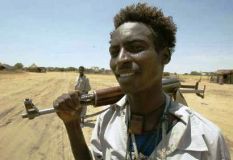Sudanese rebels threaten to quit Darfur talks over ‘air raids’
ABUJA, Oct 31 (AFP) — One of two rebel groups from the war torn Sudanese region of Darfur threatened to quit African Union peace talks over what it claimed were ongoing government air raids against civilian villages.

|
|
A member of Sudan Liberation Army (SLA) walks with his rifle at Ashma village 30 km (19 miles) from Nyala, south Darfur, October 6, 2004. |
The warning from the Sudan Liberation Movement (SLM) came as the latest blow to AU mediators who had hoped for quicker progress towards a negotiated end to the conflict as the Abuja peace conference enters its second full week.
“Last night government forces used helicopters to bombard my people in Kasott, near Kuppum, in northern Darfur,” alleged Mahgoub Hussain, a spokesman at the talks for the Sudan Liberation Movement (SLM).
“Several people were killed. We are still trying to get the exact number of civilians that died. If the government continues with the bombardments we will pull out of the Abuja talks,” he warned, in a telephone call to AFP.
A spokesman for the second rebel group at the talks, the Justice and Equality Movement, said his side was investigating reports of an attack. The government delegation said it had no knowledge of any raid.
Earlier, mediators had expressed optimism that when talks restart on Monday the warring parties will make rapid progress towards signing broad accords on the humanitarian, security and political crises in Darfur.
The African Union hopes the three agreements, if signed, will lay the basis for a lasting political settlement to Darfur’s 20-month-old civil conflict.
“We’re satisfied with the progress being made,” Doubou Niang, a political adviser to the African Union (AU) team which has come to the Nigerian capital to oversee a tense and often stormy dialogue, told AFP on Sunday.
Talks on a political settlement were stymied all last week by wrangling over a security deal aimed at reinforcing an unstable ceasefire in Darfur.
Niang said a separate security committee had discussed the issue on the sidelines of the main talks and that the warring parties were now expected to come up with a statement acceptable to both sides by Tuesday at the latest.
But after a week of bitter accusations of ceasefire violations and attacks on civilians, it was clear that deep differences remained between the sides.
On Sunday, Sudanese government spokesman Mohammed Ibrahim said that the government would never accept a rebel demand that an eventual political accord include measures to divorce Islamic religious law from Darfur’s government.
“Our brothers in the movements said they wanted a clear separation between politics and religion,” he said, warning that the government’s position on the need to apply Sharia law in northern Sudan was “non-negotiable”.
“The constitution allows freedom of religion. As individuals we’ve the right to practice the religion of our choice. But since Sharia is the law in the north, you have to abide by that law,” he said.
Both the rebels and the black African population in Darfur, which they claim to represent, are largely Muslim. Nevertheless, the SLM has demanded better protection for non-Muslims.
But Mohammed Tugod, a spokesman for the rebel Justice and Equality Movement (JEM), said that his group did not share the SLM’s position, and that he held out hope that remaining problems could be sorted out in the days to come.
The JEM and the SLM launched an armed insurrection last year, alleging that the Arab-led regime in Khartoum had left their poverty-stricken and its black African population economically and politically marginalised.
The government’s response was to unleash the Janjaweed, a proxy militia of mounted Arab gunmen, who have been accused of UN and international observers of carrying out murderous attacks on black communities.
More than 1.5 million civilians are now reported to have been displaced and are living in camps; prey to hunger, disease and militia attacks. Tens of thousands have been killed in the violence and associated deprivation.
The African Union convened the talks in a bid to resolve the crisis within the continent’s own institutions, after some Western countries threatened to impose sanctions on the government through the UN Security Council.
The body has also begun to deploy a 3,250-strong truce-monitoring force to Darfur, made up of troops from around six African countries.
